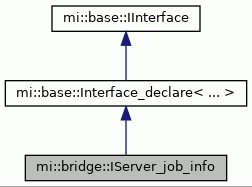mi::bridge::IServer_job_info Class Reference
[Bridge server]
Description
Provides additional information about a bridge job.
Public Member Functions
- virtual const char* get_id() const =0
- Returns the id of this job. More...
- virtual IServer_job* get_job() const =0
- Returns the Bridge job instance. More...
- template< class T>T* get_job() const
- Returns the Bridge job instance. More...
- virtual base::Uuid get_job_uuid() =0
- Returns the universally unique identifier (UUID or GUID) of the Bridge job. More...
Member Functions
- virtual const char* mi::bridge::IServer_job_info::get_id() const [pure virtual]
-
Returns the id of this job. The id is only guaranteed to be unique among the currently active jobs of the transaction and is suitable only for log messages and the like.
- virtual IServer_job* mi::bridge::IServer_job_info::get_job() const [pure virtual]
-
Returns the Bridge job instance. If the job has not been deserialized yet NULL is returned. This is the case if the job data contains tags in which case it can't be deserialized until the server-side database transaction has been started.
-
template< class T>
T* mi::bridge::IServer_job_info::get_job() const [inline] -
Returns the Bridge job instance. This templated member function is a wrapper of the non-template variant for the user's convenience. It eliminates the need to call mi::base::IInterface::get_interface( const Uuid&) on the returned pointer, since the return type already is a pointer to the type T specified as template parameter.
- virtual base::Uuid mi::bridge::IServer_job_info::get_job_uuid() [pure virtual]
-
Returns the universally unique identifier (UUID or GUID) of the Bridge job. This will always be available even if the job has not been deserialized yet. The UUID defines the job class and client side and server side job implementations share the same class id.
